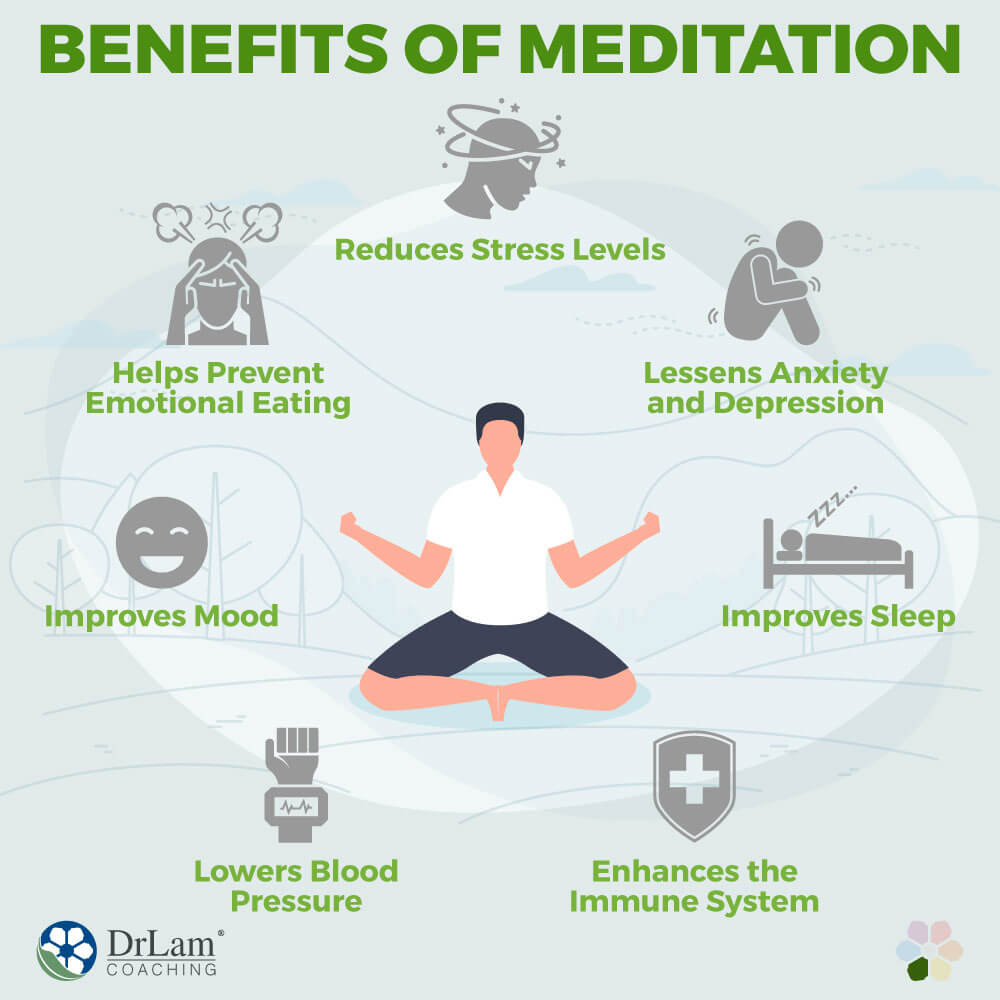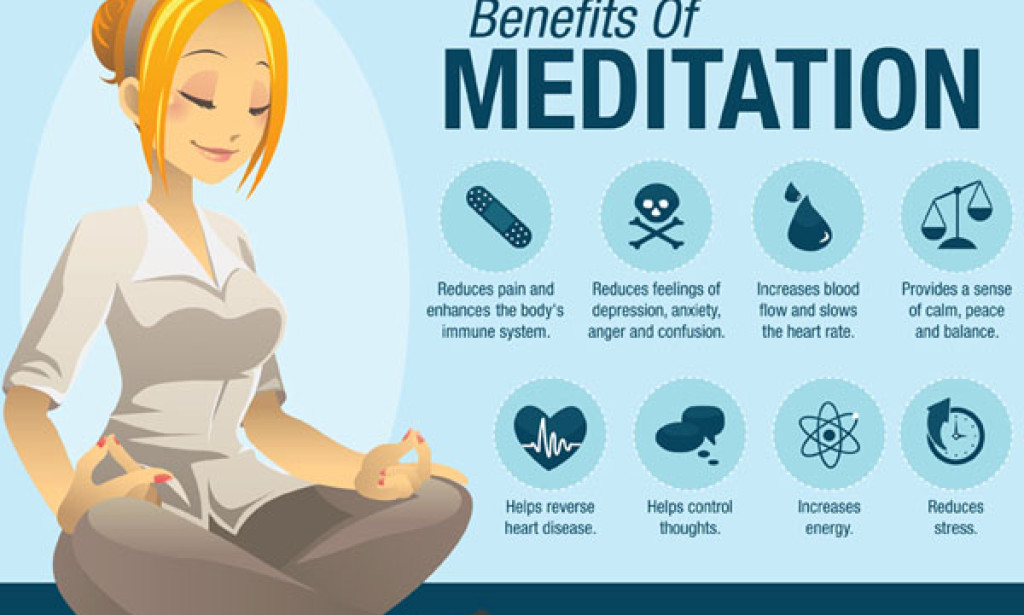INTRODUCTION:
Meditation is an ancient practice that has been used for centuries to promote mental, physical, and emotional well-being. As more people seek ways to improve their overall health in a fast-paced and stressful world, meditation has gained widespread attention for its ability to foster a sense of peace and balance. Scientific research continues to uncover the numerous benefits of meditation, proving that it’s not just a spiritual practice but a powerful tool for enhancing every aspect of our health. In this article, we’ll explore how meditation benefits the mind, body, and emotions.

Mental Health Benefits of Meditation
Meditation is perhaps best known for its ability to promote mental clarity and calm. By practicing meditation regularly, individuals can experience significant improvements in their mental health, from reduced stress levels to better focus and cognitive functioning.
-
Stress Reduction
Stress is one of the leading contributors to mental health issues such as anxiety and depression. Meditation is well-known for its ability to reduce stress by encouraging relaxation and helping individuals detach from overwhelming thoughts. Practices like mindfulness meditation help calm the mind, allowing individuals to respond to stress more effectively rather than react impulsively. -
Improved Focus and Concentration
Meditation involves training the mind to focus on the present moment, which directly improves concentration. Regular meditation practices such as mindful breathing or focusing on a mantra help strengthen attention skills. This increased focus can enhance productivity at work or school, and improve performance in various activities. -
Reduced Anxiety and Depression
Numerous studies have shown that meditation can lower the symptoms of anxiety and depression. Mindfulness meditation, in particular, helps individuals become more aware of their thoughts and emotions without judgment, allowing them to manage negative emotions better. Research suggests that consistent meditation practice increases the levels of serotonin, a neurotransmitter that regulates mood, leading to a reduction in symptoms of anxiety and depression.
Physical Health Benefits of Meditation
In addition to its mental health benefits, meditation can have profound effects on physical health, particularly in reducing the body’s stress response and promoting overall physical wellness.
-
Lowered Blood Pressure
One of the most well-documented physical health benefits of meditation is its ability to reduce blood pressure. High blood pressure is a major risk factor for heart disease and stroke, but studies have shown that meditation can effectively lower blood pressure by promoting relaxation and reducing stress. The deep breathing associated with meditation activates the parasympathetic nervous system, which helps to relax blood vessels and lower blood pressure. -
Improved Sleep Quality
Sleep disorders, including insomnia, affect millions of people worldwide. Meditation can be an effective tool for improving sleep quality by promoting relaxation and reducing the mental chatter that often keeps people awake at night. Techniques such as guided meditation, progressive muscle relaxation, and mindfulness have been shown to help people fall asleep more easily and experience deeper, more restful sleep. -
Pain Management
Meditation can also play a significant role in managing chronic pain. Mindfulness meditation, in particular, has been found to help individuals change the way they perceive pain, reducing its intensity and emotional impact. By focusing on the present moment and letting go of negative emotions associated with pain, people can experience less discomfort and improve their quality of life.
Emotional Health Benefits of Meditation
Meditation has a profound impact on emotional health, fostering greater emotional resilience, self-awareness, and overall emotional well-being.
-
Increased Emotional Resilience
Meditation helps individuals build emotional resilience by teaching them to observe their emotions without being overwhelmed by them. By practicing mindfulness and detaching from negative thoughts, individuals can develop a more balanced and stable emotional state. This emotional resilience allows people to navigate life’s challenges with greater ease and reduce the risk of emotional burnout. -
Enhanced Self-Awareness
Self-awareness is a key component of emotional health. Meditation encourages individuals to turn inward, cultivating a deeper understanding of their thoughts, feelings, and behaviors. This self-awareness helps people identify emotional triggers, recognize patterns of negative thinking, and ultimately lead to healthier emotional responses. With greater awareness, individuals can make more thoughtful and deliberate choices in how they respond to situations. -
Improved Relationships
The emotional benefits of meditation extend to our relationships as well. As meditation helps reduce stress and increase emotional resilience, it improves the ability to manage interpersonal conflicts and communicate effectively. Moreover, meditation fosters compassion and empathy, helping individuals develop a greater understanding of others’ feelings and needs. These qualities can strengthen personal and professional relationships and contribute to a more harmonious life.
How to Start Meditating for Better Health
Meditation doesn’t require special skills or experience, and anyone can start practicing it, no matter their age or background. Here are a few simple steps to get started:
-
Start Small
If you’re new to meditation, start with just 5 to 10 minutes a day. Choose a quiet space, sit comfortably, and focus on your breathing or a simple mantra. Gradually increase the duration as you become more comfortable with the practice. -
Practice Regularly
Consistency is key to reaping the benefits of meditation. Aim to meditate daily, even if it’s just for a short period. Like any other skill, meditation requires practice to develop its full potential. -
Explore Different Techniques
There are many different types of meditation, such as mindfulness, guided meditation, transcendental meditation, and loving-kindness meditation. Explore different techniques to find the one that resonates best with you. You can also use apps or attend meditation classes to guide your practice. -
Be Patient
Meditation is not a quick fix; it’s a lifelong practice that requires patience and dedication. Don’t expect immediate results—trust the process and allow the benefits to unfold over time.



You must be logged in to post a comment.